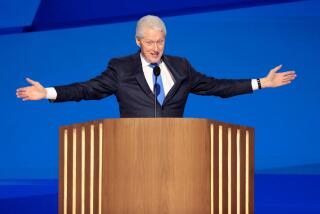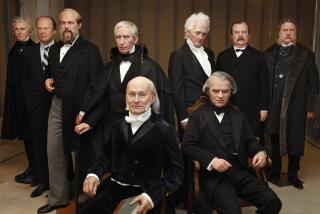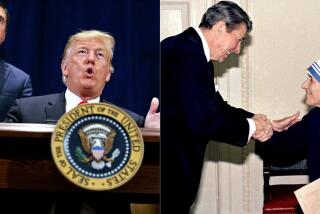A pinch of Lincoln, a dash of FDR for a perfect president
A bit of inspiration from Thomas Jefferson. A dose of national supremacy from James Monroe. Theodore Roosevelt’s bully pulpit, Ronald Reagan’s folksy charm and Bill Clinton’s empathy. Add it all up and you have the perfect president. Of course there’s no such thing, but that doesn’t stop Americans from looking for one. A Frankenstein president might look like this:
Honesty: George Washington didn’t chop down the cherry tree, but he was an honorable man. Mason Locke Weems made up the story as a parable of the larger truth.
Charm: John F. Kennedy and his wife, Jackie, oozed youthful charm and good looks in the early 1960s. They invited musicians, poets, actors and athletes to visit the White House, where the arts and culture were celebrated and children often could be seen playing. Bill Clinton emulated some of this during his 1993-2001 administration.
Populism: Andrew Jackson exploited his humble upbringing (he was the first president born in a log cabin), his history of dueling (he killed a man in 1806 and lived the rest of his life with a bullet near his heart) and his war record (he was the only president to serve in both the Revolutionary War and the War of 1812) to brand himself champion of the common man.
Cunning: Generations before Ronald Reagan was “the great communicator,” Abraham Lincoln was in many ways the nation’s first media politician. In 1832, he introduced himself to the political world through a community newspaper. He edited newspaper transcripts of his most famous speech, reinserting the phrase “a house divided against itself cannot stand” and other sentences over editors’ objections. As president, he allowed the media unprecedented access. “Lincoln was a man who understood the press and continually manipulated its chief editors to support his policies,” Jeffrey Manber and Neil Dahlstrom write in “Lincoln’s Wrath.”
Mettle: Theodore Roosevelt was a cowboy, big-game hunter, athlete, outdoorsman and explorer who noted, in 1910, that it’s not the critic who counts. “The credit,” he said, “belongs to the man who is actually in the arena, whose face is marred by dust and sweat and blood; who strives valiantly; who errs, who comes short again and again, because there is no effort without error and shortcoming; but who does actually strive to do the deeds.”
Protector: Teddy’s cousin, the avuncular Franklin D. Roosevelt, led the nation out of the Great Depression and into World War II, famously saying that “the only thing we have to fear is fear itself.” Reagan, too, exuded a fatherliness that many found appealing in a president.
Ambition: Eager to see the nation’s boundaries expanded, Americans embraced James K. Polk’s notion of “Manifest Destiny,” an ideology that held it to be the destiny of the United States to expand to the Pacific Ocean and spread the blessings of liberty.
Spirituality: Democrat Jimmy Carter may have been the nation’s first evangelical president. George W. Bush called Jesus his favorite philosopher.
Authenticity: Harry Truman took long walks in public near the White House, which he called the “Great White Jail,” and never seemed to lose touch with his Missouri roots. “I have had all of Washington I want,” he wrote after choosing not to seek another term. “I prefer my life in Missouri and I prefer to live the way I do.”
Decisiveness: George W. Bush persuaded wary voters to back his reelection despite concerns about the war in Iraq, saying in his 2004 convention speech: “Even when we don’t agree, at least you know what I believe and where I stand.” Afterward, as war news worsened, voters started to perceive stubbornness.
More to Read
Sign up for Essential California
The most important California stories and recommendations in your inbox every morning.
You may occasionally receive promotional content from the Los Angeles Times.










